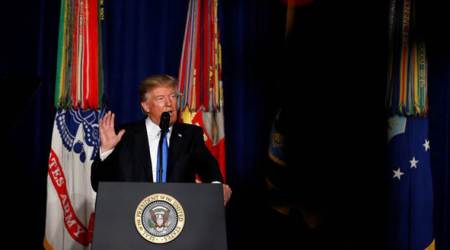 New Delhi “welcomed” Trump’s “determination” to confront the issues of safe havens and other forms of cross-border support enjoyed by terrorists — an apparent reference to Pakistan (File)
New Delhi “welcomed” Trump’s “determination” to confront the issues of safe havens and other forms of cross-border support enjoyed by terrorists — an apparent reference to Pakistan (File)
WITHIN HOURS of US President Donald Trump spelling out his administration’s strategy for Afghanistan and South Asia, 16 years after the US launched its war on terror, New Delhi “welcomed” his “determination” to confront the issues of safe havens and other forms of cross-border support enjoyed by terrorists — an apparent reference to Pakistan.
Warning Pakistan against the continued support to terror networks, Trump said: “We can no longer be silent about Pakistan’s safe havens for terrorist organisations, the Taliban, and other groups that pose a threat to the region and beyond… Pakistan has much to gain from partnering with our effort in Afghanistan. It has much to lose by continuing to harbour terrorists.”
Shortly after Trump’s speech, the Ministry of External Affairs (MEA), in a statement, said, “We welcome President Trump’s determination to enhance efforts to overcome the challenges facing Afghanistan and confronting issues of safe havens and other forms of cross-border support enjoyed by terrorists. India shares these concerns and objectives”.
Sources said that US Secretary of State Rex Tillerson called up External Affairs Minister Sushma Swaraj before Trump’s speech to give the Indian government a “heads up” on the broad elements of the US strategy.
This, sources said, will form one of the core areas of bilateral conversation between India and the US in the coming months, especially in the new 2+2 dialogue format between Defence and External Affairs Ministers of both countries. This new format is going to replace the Obama administration’s Strategic and Commercial Dialogue (S&CD) between Foreign and Commerce Cinisters.
The MEA also reiterated India’s commitment to remain engaged in achieving a stable and strong Afghanistan. “We are committed to supporting the government and the people of Afghanistan in their efforts to bring peace, security, stability and prosperity in their country. We have been steadfast in extending reconstruction and development assistance to Afghanistan in keeping with our traditional friendship with its people. We will continue these efforts, including in partnership with other countries,” it said.
The MEA’s statement was in response to Trump reaching out to India in his speech. “We appreciate India’s important contributions to stability in Afghanistan, but India makes billions of dollars in trade with the United States, and we want them to help us more with Afghanistan, especially in the area of economic assistance and development,” said the US President.
From New Delhi’s perspective, Trump’s statement has been broken down into two parts. First is the six-month-old US government’s “clear and robust” language on terrorist safe havens in Pakistan. “This is a much-needed acknowledgement and change in the US approach,” said an Indian diplomat.
Indian officials are particularly enthused by Trump’s reference to Pakistan when he said, “For its part, Pakistan often gives safe haven to agents of chaos, violence, and terror… Pakistan has also sheltered the same organisations that try every single day to kill our people. We have been paying Pakistan billions and billions of dollars, at the same time they are housing the very terrorists that we are fighting. But that will have to change, and that will change immediately. No partnership can survive a country’s harboring of militants and terrorists who target US service members and officials. It is time for Pakistan to demonstrate its commitment to civilisation, order, and to peace.”
This, sources said, is a much stronger statement than the US President Barack Obama’s statement in 2009. “We will strengthen Pakistan’s capacity to target those groups that threaten our countries and have made it clear that we cannot tolerate a safe haven for terrorists whose location is known and whose intentions are clear. America is also providing substantial resources to support Pakistan’s democracy and development,” he had said.
Officials said what needs to be seen is the follow-up action against Pakistan-based groups by the Trump administration. “Early signs like listing Hizbul Mujahideen and Syed Salahuddin have been quite encouraging. It needs to be seen whether the US government keeps the heat on through measures,” said the Indian government official.
The other aspect, that is important from New Delhi’s perspective is Trump urging India to step up its engagement.
According to Delhi, its commitment of US$ 3 billion is a significant contribution. Officials here said that India is the fifth-largest aid provider to Afghanistan, 4,000 Afghan officers are trained in Indian defence and police academies, India has given attack helicopters to Afghan security forces, 16,000 Afghan students are studying in India. And on the infrastructure front, India has constructed the Afghan parliament, the Salma Dam, and the Zaranj Delaram highway.
“When the US President says that India needs to do more… it is an under-appreciation of India’s contribution in the hostile conditions created by Pakistan-sponsored and fuelled groups. We are a bit confused, but that is definitely going to be discussed between our leaders during the 2+2 dialogue or other bilateral meetings. Let’s see what they have in mind,” said an Indian diplomat. He, however, added that India is ready to do more, and will continue to do more. “What sometimes goes unnoticed are the small development projects that the Indian government does, which is extremely need-based of Afghan people…and they are not big bang projects,” said the diplomat.
Asked about Trump’s reference to India making “billions of dollars in trade” with US, the official quipped, “That’s his typical style to put transactional ideas, prefacing any demand. We have seen it earlier during Prime Minister Modi’s visit, not to be worried about.”
For Delhi, what is also important is that it does not want to get drawn into the equivalence and hyphenation as was proposed during the Obama administration, when it appointed Richard Holbrooke who tried to link India and Pakistan’s bilateral issues in Kashmir with Afghanistan’s problems.
So, some in Delhi expressed a sense of trepidation at Trump’s statement that “the threat is worse because Pakistan and India are two nuclear-armed states whose tense relations threaten to spiral into conflict. And that could happen.”
“The last thing we want is being drawn into an India-Pakistan hyphenation when it comes to US strategy in Afghanistan… but we understand this is a reference about South Asia. But we will have to keep a hawk’s eye on where this is going,” said the Indian official.

